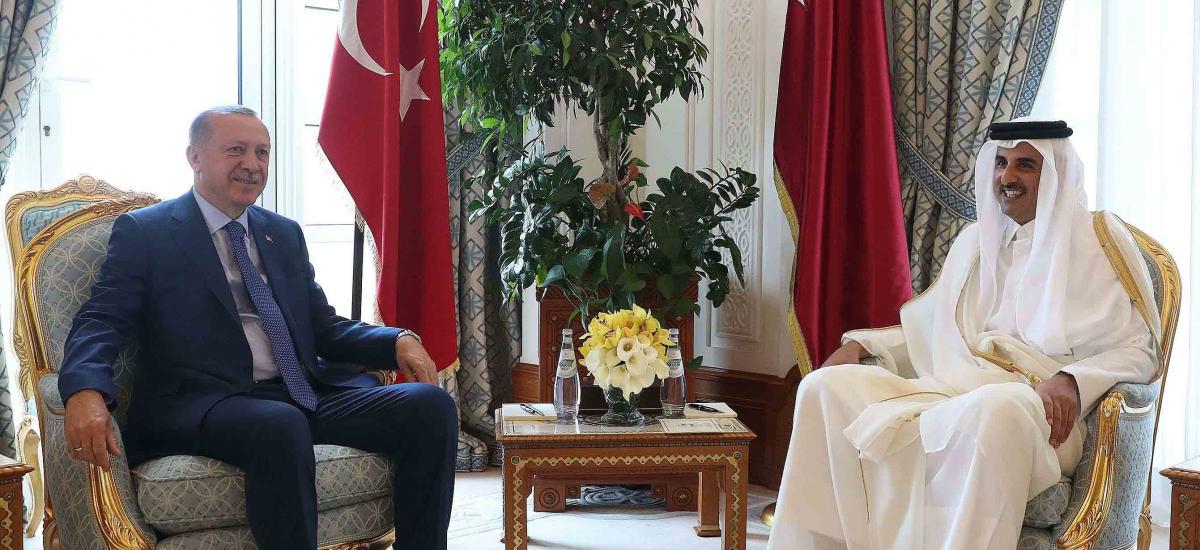Hours after strong statements by Egyptian President Abdel-Fattah al-Sisi, Turkish President Recep Tayyip Erdoğan made a phone call to Qatari Emir Sheikh Tamim bin Hamad al-Thani.
The Qatar News Agency said that the call discussed “strategic relations between the two countries and ways to support and develop them,” in addition to discussing “a number of regional and international issues of common concern.”
However, sources told The Arab Weekly that Erdogan really called to ask the emir to double Qatari funds for the war operation in Libya, in which Ankara has been heavily involved in support of the militias of the Government of National Accord (GNA) against the Libyan National Army (LNA), led by Field Marshal Khalifa Haftar.
A former Turkish diplomat, speaking on condition of anonymity, speculated that “the focus of the phone call was purely financial,” saying that Erdogan’s government “does not tire in its demands for more money from Doha to sustain the momentum of Turkish military operations in Syria and Libya.”
In his statements on Sunday, Sisi hinted at Egypt’s possible use of military force to stop the advance of Turkish-backed militias towards Libyan areas deemed directly related to Egyptian national security.
According to experts familiar with Turkish politics, Erdoğan, disdained by his opponents and rivals who consider him to be opportunistic, has been using the Libyan conflict, and previously the Syrian conflict, to pressure Qatar into providing him with huge sums of money. He does this by warning the Qatari leadership that the Doha-backed Islamist camp could suffer a defeat that would be catastrophic for them, allowing their rivals to control strategic areas in the region.
The diplomat, who asked not to be named and to only be referred to by his previous work in the Gulf region, said that the Egyptian president’s statements provide an excuse for Ankara to urge Doha to pump more money into the conflicts it is waging in the region.
“Qatari gas money has played a major role in financing those conflicts and wars, especially that Turkey cannot bear their burdens in light of the successive economic and financial crises witnessed by the country during the past years,” the former Turkish diplomat said. “The latest of these crises was the impact of the coronavirus pandemic, which battered the tourist sector, being an important source of revenue for the Turkish treasury.”
To carry out its foreign objectives, Turkey needs direct assistance from its ally Qatar, which has regularly pumped funds into the Turkish economy in the form of deposits and investments, adding up to some $15 billion by 2018, according to Qatari government statements.
Media reports, however, claim that the figure presented by Doha does not include all Qatari funds provided to Ankara, such as additional millions in direct donations from Qatari leaders and businessmen.
The discussion of “strategic relations” between Ankara and Doha, according to the former Turkish diplomat, is a loose term that has always been circulated by official news outlets.
However, they added that Turkish leadership does not usually discuss the details of the issues it is working on, such as the Libyan file.
Ankara only addresses the big picture, he said, making the Qataris think they are playing a big role and are an equal partner in addressing issues of regional concern.
Qatar’s role, however, is really limited to providing the funding – it then waits for Turkey and its army to carry out their mission, according to the former diplomat.
As a result, the Qatari people have always considered their country’s relationship with Turkey to be uneven, making their government increasingly vulnerable to exploitation and extortion.
This reality is further exacerbated by the isolation measures imposed on Qatar by four Arab countries – Egypt, Saudi Arabia, the United Arab Emirates and Bahrain — since 2017 over Doha’s alleged ties with terrorist organisations and policies aimed at regional instability.
Qatari critics of the policies of Sheikh Tamim and his father, Sheikh Hamad bin Khalifa al-Thani, have multiplied their warnings about alleged Turkish blackmail, revealing a leaked document that shows the existence of secret agreements between Ankara and Doha allowing Turkey to intervene in Qatari territory without any clear guarantees for the Gulf emirate.
While Qatar and Turkey have presented their relationship as a “strategic alliance,” the reality is different given their disproportional influence, said a Qatari dissident, noting that this factor “makes Qatar isolated in its vicinity and vulnerable to exploitation and even extortion by Turkey, which boasts many capabilities in all fields.”
But the high costs of Turkish intervention in Libya have reportedly exceeded Turkey’s means, especially in view of the economic and financial difficulties the country is facing at home.
This has made Qatar the main, and perhaps, sole sponsor of the Turkish war efforts despite the difficulties Doha itself is facing with the impact of the coronavirus pandemic and fall in oil prices.
Qatar has only a few options and cannot help but accept Turkish demands, especially after Ankara reinforced the Gulf country’s regional isolation and plunged Doha into complex conflicts across the Arab world and elsewhere.
(This article was first published in the Arab Weekly, this is only an excerpt)
You can follow our English language YouTube videos @ REAL TURKEY: https://www.youtube.com/channel/UCKpFJB4GFiNkhmpVZQ_d9Rg
And content at Twitter: @AtillaEng
Facebook: Real Turkey Channel: https://www.facebook.com/realturkeychannel/
